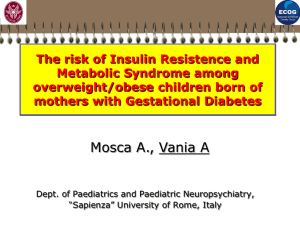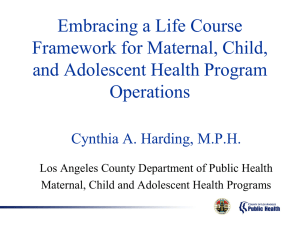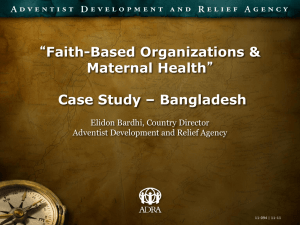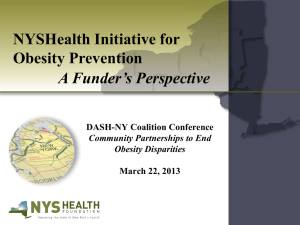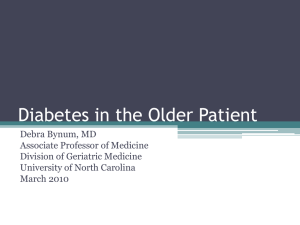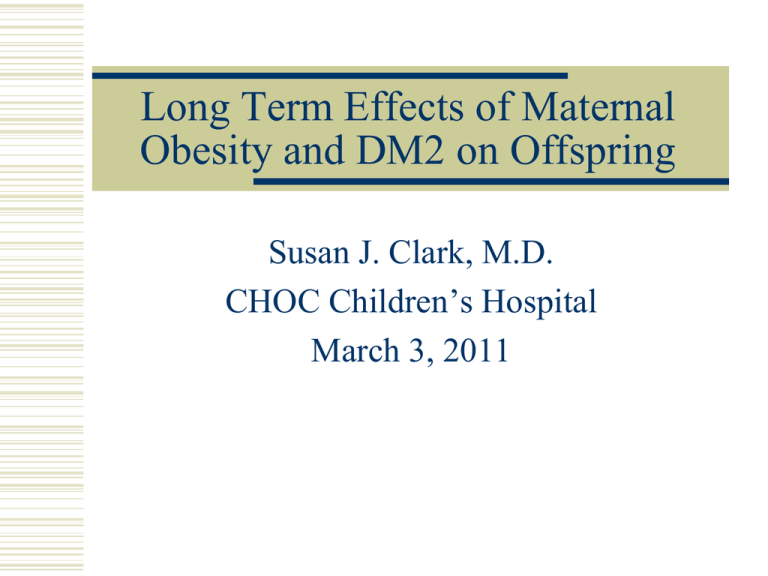
Long Term Effects of Maternal
Obesity and DM2 on Offspring
Susan J. Clark, M.D.
CHOC Children’s Hospital
March 3, 2011
Long Term Effects of Maternal
Obesity and DM2 on Offspring
The effects of:
Low Birth weight on development of DM2 in
adults
Maternal obesity on children, adolescents, and
adult offspring
Maternal diabetes on children, adolescents and
adult offspring
Abbreviations Used
DM – diabetes
GDM – gestational diabetes
PGDM – diabetes before pregnancy
IGF - impaired glucose tolerance
BW – birth weight
SGA – small for gestational age
LGA – large for gestational age
Fetal Programming of Diabetes
Fetal programming – the process influencing long
term fetal outcomes
New specialty – Developmental Origins of Health
and Disease (DOHaD)
The intrauterine environment dictates how genes
function
Epigenetic – the processes which govern evolution
of an individual phenotype from the genome
Yajnik, CS. Diabetes Care 33:1146, 2010
Fetal Programming
“A stimulus or an insult at a critical and sensitive
period of early life permanently alters the
organisms physiology and metabolism.”
“Programming may be induced by nutritional,
metabolic, and hormonal events.”
“The fetus exposed to maternal diabetes is
“programmed” to display abnormal glucose
tolerance later in life.”
Fetita L et al. JCEM:3721, 2006.
The Effect of Low Birth
Weight
Intrauterine Undernutrition
SGA - Small for
gestational age
<2500 gm
Thrifty phenotype
Twin studies – lower
BW twin has greater
risk of DM2
SGA + catch-up growth
in childhood causes
high risk of DM2
http://newborns.stanford.edu/images/sga1.jpg
Low Birth Weight and DM2
1992 UK - 64 year old men who were smallest at
birth were 6X more likely to have DM2
Monozygotic twin discordant for diabetes – DM
twin had significantly lower BW
Dutch Hunger Winter 1944-1945 – poor maternal
nutrition especially 3rd trimester caused decreased
fetal growth. Then at 50 years old was associated
with poor glucose tolerance and insulin resistance.
Reusens B et al. Current Drug Targets. 8:935, 2007.
Low Birth Weight and DM2
Gila River Indian Community in Arizona
Pima or Tohono O’odham or a mixture
Mothers age 40.6 +/-14.5 yrs; DM2 in 50%
Fathers age 42.9 +/- 12.8 yrs; DM2 in 41%
Maternal diabetes was positively (P<0.0001)
and Paternal diabetes negatively (P<0.001)
associated with birth weight.
Lindsay, Diabetes 49:445-449, 2000
Low Birth Weight and DM2
1608 infants
Mean gestational age 39.7+/-1.2 weeks
Mean birth weight 3,573 +/- 488 g
Lowest 20% BW showed 1.8 fold increased risk of
fathers developing diabetes later (P=0.004)
Fathers of low birth weight offspring have an
increased lifetime risk of diabetes, as do their
offspring.
Lindsay, Diabetes 49:445-449, 2000
Low Birth Weight and DM2
Catch up growth
South Africa – LBW with rapid childhood weight gain
had worst glucose tolerance
India – LBW but were the heaviest at age 8 were most
insulin resistant
Finland – LBW but accelerated growth after age 7 years
– most likely to have DM
SGA had increased insulin sensitivity at birth but by 3
years were more insulin resistant that AGA
Reusens B et al. Current Drug Targets. 8:935, 2007.
Birth Weight and DM2 Risk
Youth
U-shaped curve for
BW and risk of DM2
in childhood
Both SGA and LGA
are associated with
DM2 later in life
Shaw J. Ped Diab: 8(Supp 9):7-15, 2007
Wei JN et al. Diab Care 26:343, 2003
Thrifty Phenotype Hypothesis
Two essential elements
Poor fetal nutrition resulting in changes of key
organs beneficial to survival in conditions of
poor postnatal nutrition.
Postnatal adequate or excessive nutrition causing
these otherwise beneficial adaptations to result in
adult diseases (DM2, hypertension, and ischemic
heart disease.) Reusens B et al. Current Drug Targets. 8:935, 2007.
What We Already Know
About Obesity and Diabetes
Age-adjusted percentage of adults aged ≥20 years
who are obese, 2007
MMWR 58:1259-1263, 2009
CDC’s Division of Diabetes Translation. National Diabetes Surveillance System
available at http://www.cdc.gov/diabetes/statistics
Age-adjusted percentage of adults aged ≥20 years with
diagnosed diabetes, 2007
MMWR 58:1259-1263, 2009
CDC’s Division of Diabetes Translation. National Diabetes Surveillance System
available at http://www.cdc.gov/diabetes/statistics
Trends in Obesity among Children
and Adolescents
CDC’s Division of Diabetes Translation. National Diabetes Surveillance System
available at http://www.cdc.gov/diabetes/statistics
Prevalence of Obesity Among Girls
12-19 years old
CDC’s Division of Diabetes Translation. National Diabetes Surveillance System
available at http://www.cdc.gov/diabetes/statistics
The Effect of Maternal Obesity
Obesity Leads to Obesity
800 mothers and offspring
Best model to predict obesity
Childhood (4-5 years):
Adolescence (9-14 years):
Birthweight
Weight gain in infancy
Delivery type
Maternal obesity is
the strongest
predictor of obesity
at all times studied
Maternal smoking status
Gestational weight gain
Weight gain during infancy
Young Adult (19-20 years):
Maternal smoking status
Gestational weight gain
Birth weight
Rooney BL Matern Child Health J 2010
Oct 7 epub ahead of print
Maternal Obesity and Offspring
Adiposity in Young Adults
Reynolds JCEM 95:5365-69, 2010
Maternal Obesity and Offspring
Adiposity in Young Adults
276 adults. Age 27-30
Greater offspring % body
fat and waist circumference
were independently
associated with:
Higher maternal BMI
Greater gestational
weight gain
First born (even though
BW is less)
Adiposity in adulthood is
influenced by prenatal
influences independently
of current lifestyle factors.
Impact of maternal
adiposity on offspring
obesity risk persists into
adulthood.
Reynolds JCEM 95:5365-69, 2010
Intrauterine Exposure of DM2
Youth to Maternal DM2 and Ob
Percentage of youth exposed in utero to:
Maternal Diabetes
White box DM2 Black box control
Mat overweight/ob
Dabelea 2008 Diab Care 31:1422
Intrauterine Exposure of DM2
Youth to Maternal DM2 and Ob
Intrauterine exposures to
maternal obesity are
strongly associated with
DM2 in youth independent
of diabetes during
pregnancy.
Overall, 47.2% of DM2 in
youth could be attributed to
intrauterine exposure to
maternal diabetes and
obesity.
Prevention efforts need
to target, in addition to
childhood obesity, the
increasing number of
pregnancies
complicated by obesity
and diabetes.
Dabelea Diab Care 31:1422-1426,
2008
Maternal Surgical Weight Loss
Maternal Bariatric Surgery - biliopancreatic
diversion.
Studied children born after maternal surgery (AMS)
compared to children born before maternal surgery
(BMS)
Recruited in Quebec from July 2007–January 2008
Study cohort
Mothers 49
Children BMS 54
Children AMS 57
Smith JCEM 94:4275-83, 2009
Maternal Surgical Weight Loss
Maternal effects of
bariatric surgery
Lower prepregancy weight ,
BMI
Lower gestational weight
gain
Lower glucose & lipids
Reduced pregnancy
complications (GDM, HTN,
and preeclampsia)
Smith JCEM 94:4275-83, 2009
Effects on children
AMS compared to BMS
Reduced birth weight (>4
kg, 1.8% cf to 14.8%)
Lower BMI (10.5%
>98%tile cf to 35.2%)
Lower lipids
Lower markers of insulin
resistance
Lower inflammatory
markers
Higher ghrelin, lower leptin
The Effect of Maternal
Diabetes
Infant of the Diabetic Mother
History
Pre – insulin era – maternal starvation used to lower BG
levels and avoid fetal death – most infants low BW
Post – insulin era low BW secondary to severe vascular
complications
1959 Farquar described the appearance of the infant with
hyperglycemia
1967 Pederson – summarized size and maturity
DM2 – The Role of Maternal
Inheritance
Adults with DM2 had a higher prevalence of
DM2 on the maternal side
In women with GDM a higher frequency of
diabetes was reported in the mothers
In the UK and France, people with DM2
have twice as many mothers as fathers with
DM2
Fetita, L et al. JCEM 91:3718, 2006.
Infant of a Diabetic Mother
Large for gestational age
>4000 gm
Genetic and
environmental risk of
DM2 associated with
high BW and maternal
diabetes in pregnancy
Shaw J. Ped Diab: 8(Supp 9):7-15,
2007
http://img87.imageshack.us/img87/7109/infantofdiabeticmother.jpg
GDM – Offspring with Obesity
At 15-19 year of age 58% of offspring of DM2
mothers weighed 140% or more of their ideal
weight compared to to 17% with no DM2.
Pettitt, DJ et al. NEJM 308:242, 1983
By 8 years old, 50% of offspring of DM mothers had
weights >90%tile compared to offspring of non DM
mothers.
Silverman BL et al. Diab 40:121, 1991
Range of Maternal Glycemia:
Risk of Obesity in Childhood
9439 women in a large multiethnic US
population (Hawaii and Northwest/Kaiser)
1995-2000
Universally screened for GDM with 50 gm
glucose challenge test (GCT)
Weight measured in children ages 5-7 years
Hillier, Diabetes Care 30:2287-2292, 2007
Range of Maternal Glycemia:
Risk of Obesity in Childhood
Results:
The highest quartile of hyperglycemia on GCT was
associated with higher level of childhood obesity
compared to lowest quartile (P<0.0001)
Increasing maternal glycemic level was associated with a
greater prevalence of macrosomia
Children who were macrosomic at birth had a higher
prevalence of childhood obesity irrespective of maternal
glycemic level
Hillier, Diabetes Care 30:2287-2292, 2007
Range of Maternal Glycemia:
Risk of Obesity in Childhood
The risk of childhood
obesity was nearly double
when mothers had FBG
>95 mg/dl
Increasing maternal
hyperglycemia associated
with increased childhood
obesity was significant
only among children who
were not macrosomic at
birth
Hillier, Diabetes Care 30:2287-2292, 2007
DM2 – Fetal Exposure to GDM
Pima Indians
Offspring of DM2 mothers had greater frequency of
diabetes compared to those with DM2 fathers
Lindsay RS et al. Diab 49:445, 2000
At age 20-24 years, if mother had GDM, 45% had DM2
compared to 8.6% in PGDM and 1.4% in non DM.
Pettitt, DJ et al. Diabetes 37:622, 1988.
At age 25-34 years, if mother had GDM, 70% had DM2
compared to 15% without GDM
Dabeala D et al. J Mat Fet Med 9:83, 2000
Risk of DM2 in Maternal
Diabetes
Pima Nuclear Families with children born
before and after Mom developed DM2
After maternal DM2, 3.7 times higher risk of
developing DM2
After maternal DM2, higher BMI
Both compared to full siblings born before
maternal DM2
Dabelea D et al. Diabetes 49:2208, 2000. Fetita L et al. JCEM 91:3718, 2006
Risk of DM2 in Maternal
Diabetes
Conclusions: In Pima Indians
Intrauterine exposure to the diabetic environment
increases risk of obesity and DM2 beyond that
attributable to genetic factors. Fetita, L et al. JCEM 91:3719,2006.
The “epidemic” of DM2 in children “was almost entirely
accounted for, statistically, by the increase in exposure to
diabetes during pregnancy and the resultant increase in
obesity”
Dabelea Diab Care 30:S169, 2007.
Maternal DM2 and End-Stage
Renal Disease in Young Adults
Pima Indians – between 1965 and 2007 enrolled in
study if >5 years old
Diabetes defined as OGTT 2hr BG >200
ESRD defined as initiation of renal replacement
therapy or death
102 (5.5%) of 1850 persons with DM2 were
offspring of diabetic mothers (IDE)
ESRD occurred in 57, 5 of whom had IDE
Pavkov Diab Care 33:2396-98, 2010
Maternal DM2 and End-Stage
Renal Disease in Young Adults
Those exposed to DM2 intrauterine (IDE)
Were younger at baseline (17.5 yrs vs 34.2 yrs)
Exposure to IDE was associated with a fourfold
increase in the incidence of ESRD in young
adults with DM2 when adjusted for age and sex
This effect largely explained by their earlier age
of onset of DM2. (With adjustment for age at
DM2 onset, ESRD incidence was similar in the
two groups)
Pavkov Diab Care 33:2396-98, 2010
Maternal DM2 and End-Stage
Renal Disease in Young Adults
Cumulative incidence of diabetic ESRD
By age
Duration of Diabetes
Pavkov Diab Care 33:2396-98, 2010
IGT in Offspring of Maternal
DM (Multiethnic)
Diabetes in Pregnancy
Study at Northwestern
Univ in Chicago
Prevalence of IGT in
offspring of diabetic
mothers in three age
groups and controls
(age 10-16 yrs)
Silverman Diab Care 18:611-617, 1995
IGT in Offspring of Maternal
DM (Multiethnic)
Mothers had pregestational DM (PGDM) either DM1 or
DM2 or gestational DM (GDM)
In PGDM the prevalence of IGT rose from 9.4% at 1-4
years old to 17.4% at 5-9 years old
In GDM, the prevalence of IGT rose from 11.1% at 1-4
years old to 20% at 5-9 years old
Plagemann A et al. Diabetologia 40:1094, 1997
In PGDM or GDM , offspring had 36% prevalence of
IGT at 16 years old.
Silverman BL et al. Diab Care 18:611, 1995
Prevalence of DM2 in
Offspring of Maternal Diabetes
No diabetes (open)
Diabetes (solid)
PreDiabetes (hatched)
Dabelea J Pediatr Endoc 14:1085, 2001
Treatment of GDM
370/9439 multiethnic women in the US with
GDM were treated with diet or diet/insulin
Prevalence of obesity in 5-7 year olds
Maternal FBG >95 mg/dl was 20%
Treated GDM group was 17.3%
Suggests treatment of GDM may modify the
risk of obesity but needs further research
Hillier, Diabetes Care 30:2287-2292, 2007
Treatment of GDM
199 mothers with “mild
GDM” (24-34 weeks
gestation)
Randomized controlled
trial
Treatment with diet or
diet/insulin
Measured BMI of 4-5 year
old children
Results:
Macrosomia
Treated 5.3%
Control 21.9%
Significant
BMI Z score of 4-5 year olds
Treated 0.49
Control 0.41
Not significant
Gillman, Diab Care 33:964-968, 2010
IGT in Offspring of Maternal
Type 1 DM
Offspring of PGDM1 mothers without a family
history of DM2 were studied
Adult offspring are more likely to have impaired
glucose tolerance (33%) and a deficient insulin
secretory response to glucose
There was no difference in adiposity or insulin
resistance
Sobngwi 2003 Lancet 361:1861-65
Breast Feeding and Maternal
Diabetes
In maternal DM1, breast feeding has been linked to
lower rates of DM1 in susceptible individuals
In offspring of women with GDM, it is
inconclusive whether breastfeeding reduces the risk
of overweight, obesity and DM2.
In offspring of Pima Indians with DM2, lower rates
of DM2 may occur
Gunderson 2007 Diab Care 30:S161
The Perfect Storm
The Vicious Cycle
Type 1 diabetes – 70% increase by 2020
Type 2 diabetes – 17-49/100,000 pt yrs in 15-19 yr olds
Gestational diabetes – 3.3% to 5.3% (2005) to 14.9%
(Newport Beach) and ? In San Bernardino
Increased infants of diabetic mothers
Increased incidence of obesity
Increased incidence of Type 2 diabetes
Diabetes Begets Diabetes
PGDM
Maternal Fuels
GDM
Impaired Adult
Islet Function
Altered Fetal
Islet Function
Child
Obesity
Pubertal IGT
Metzger BE. Clin. Ob Gyn 50:972, 2007
The Perfect Storm
Will this ever end? HOW?
Must inform patients, medical staff, public
Must tighten management of GDM, DM1, DM2
Must prevent obesity in children who are Infants
of DM
Must prevent obesity and metabolic syndrome in
young female adolescents
Must decrease incidence of GDM
Counties in the top and bottom two quintiles of both
diabetes and obesity, 2007
MMWR 58:1259-1263, 2009
CDC’s Division of Diabetes Translation. National Diabetes Surveillance System
available at http://www.cdc.gov/diabetes/statistics

